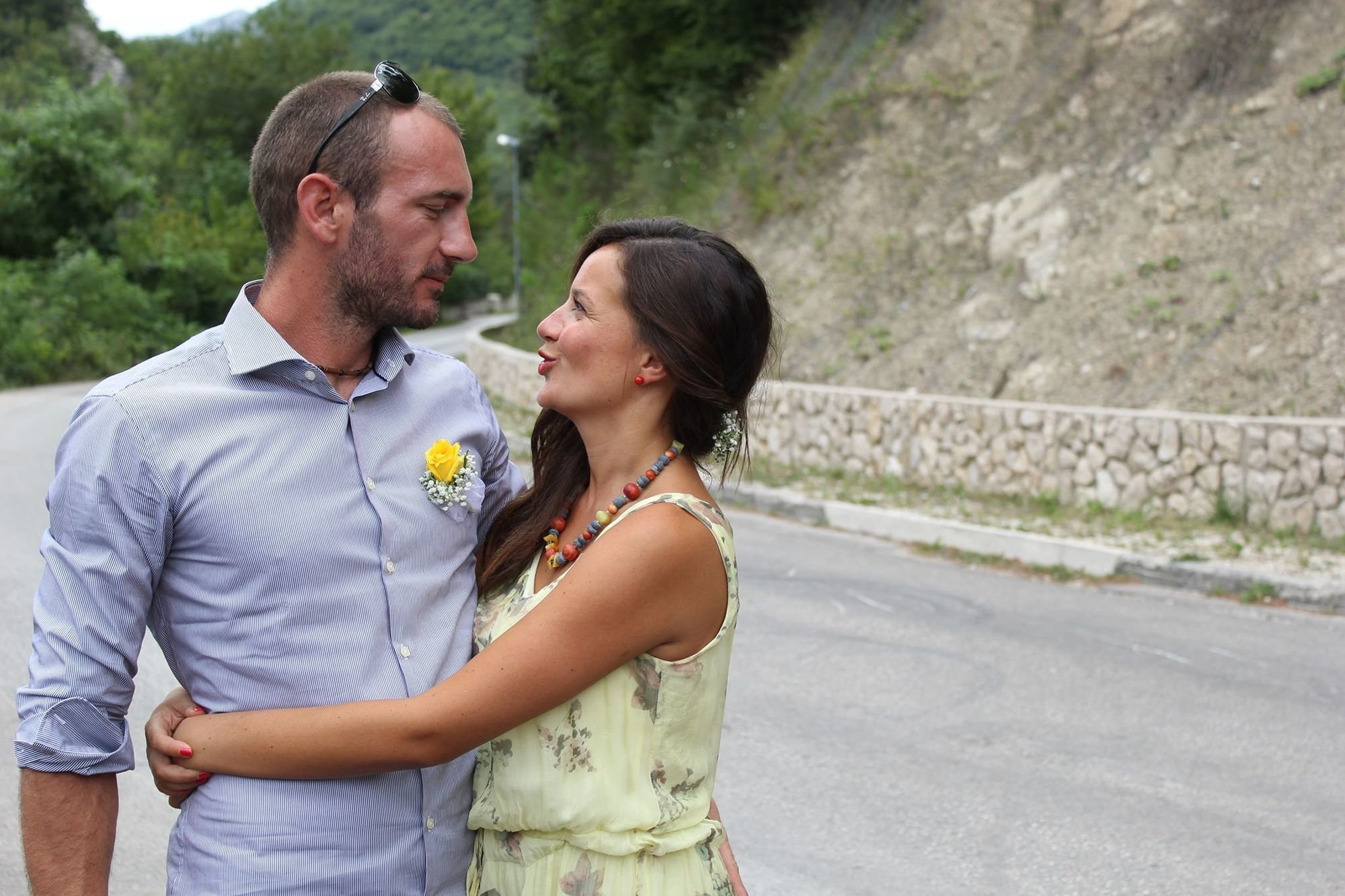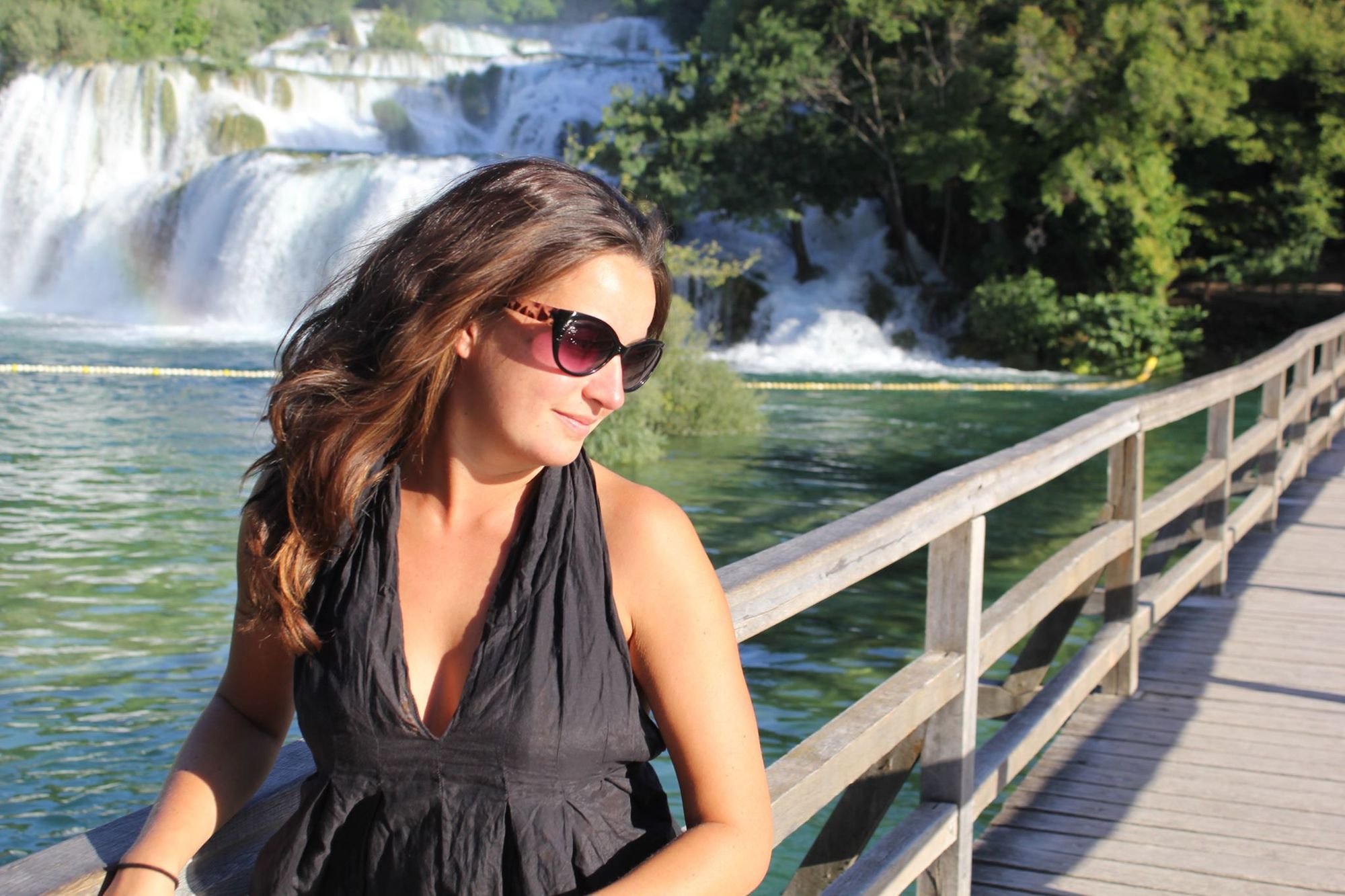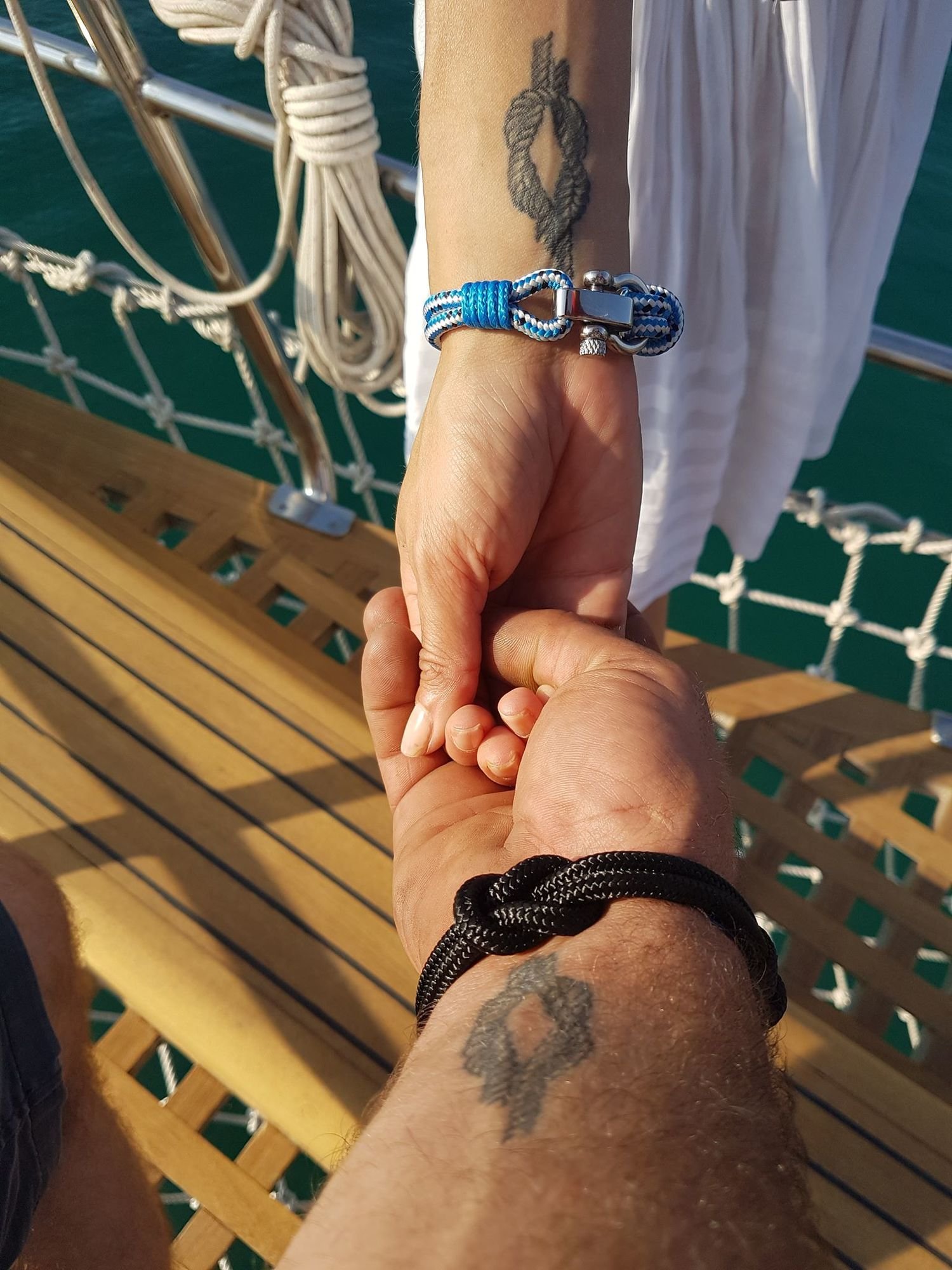Written by Tash Peričić, a Māori/New Zealander living in Dalmatia.
After working on a boat in Croatia as a tour guide, Tash made the rooky mistake of falling in love with the Captain, and the rest, they say, is history. Married and living in Croatia for the past 5 years, Tash has been navigating life in this beautiful, foreign country. Presently Tash works as part of a ‘2-man’ crew aboard a gorgeous charter sailing yacht with her husband and is a freelance writer for various platforms and plans to soon write her first book.

I am currently approaching my fifth wedding anniversary, which also means I have been living in Croatia for five years – whaaaat, how did that happen?? As such, it seemed like a good time to reflect. After a year or so of living in Croatia, I wrote an article about the “truth behind the expat fairy tale”; it was the first time I spoke up about my struggles, and the response was incredible – I had so many people reach out and say “oh, thank god it’s not just me!” It turns out we were all feeling the same way, which made us all feel less alone in Struggleville.
Five years down the track, and I have definitely come out on the other side, don’t get me wrong, there are still struggles, but I don’t think anything will compare to those first two years. Now I am meeting ‘fresh’ expats, the brave ones who have just taken the leap and moved to Croatia, full of hope and wonder… only to be smacked around by this expat experience. I almost feel like a veteran; I sit with them and want to reassure them that these are just the growing pains, and it does get better.
So, I thought maybe it is time to share these thoughts and experiences out loud again (thanks, Chasing the Donkey, for having me); if it helps or assures only a couple of people in their endeavor, then I’ll be happy. There are obviously more than five struggles, but these were the main points that stood out for me, and it ties in nicely with my 5th anniversary.
The frustrations in bureaucracy and the actual ‘how to set up a life’ have been covered in a number of ways, and Chasing the Donkey has given plenty of practical advice over the years; so instead, I am going to focus on the emotional journey and challenges we face as new expats in Croatia.
Skip Ahead To My Advice Here!
1. Be Prepared For Tears, The Emotional Struggle

The reality of my tumultuous emotions was like an uppercut; it took me by complete surprise and was damn near just as painful. Now, I am an emotional creature by nature, but I am also a strong, independent, successful woman in my own right. Yet, after moving to Croatia, I found myself in bouts of messy, hyperventilating tears more often than I want to count; my emotions were wild and unpredictable.
Anything could set me off, from missing family and friends to not knowing how to ask for bread at the supermarket. The more I cried – the more frustrated I would get at myself – the more I would cry. It was a vicious cycle. I made it worse because I struggled to ask for help, and because I was married, everyone assumed I was ok; so, very few people checked in on me.
A hard-learned lesson on this journey has been to ask for help when I need it; many of my tears and frustrations could have been eased by simply reaching out and asking for help. I still struggle a little with this, but I can now see that if I am willing to help others, I need to show the same amount of grace in asking for and receiving help.
My advice? Go easy on yourself and ask for help when you need it. You have just changed EVERYTHING about your life, and these changes take an extraordinary emotional and psychological toll which most of us just don’t acknowledge. So, be prepared for tears, they will come, but it’s all part of the process.
2. Who Am I? The ‘Holy Shit I Lost My Identity’ Struggle

I moved to Croatia to be with a man I fell in love with; besides that, I had ZERO ties to Croatia.
Finding myself in a foreign country with no family, friends, career, or even language was one of the most challenging and confronting experiences of my life.
For most of our lives, there is always something that defines us – family, friends, community, job… strip all of this away, and what are you left with? Even characteristics I attributed to myself – funny, outgoing, kind, motivated… all fell away. It’s hard to be funny, outgoing, kind, or motivated when you are depressed and feel like shit. It felt like a complete loss of identity, and in essence, it was.
I could write an entire book on this phase alone, but to keep it very real – it was a dark place; I was deeply depressed for the first year or so of living here. Now that I have come out on the other side and spoken to more people about their experiences, it seems we all went through something similar in our own way.
Personally, I needed to face my demons and rediscover myself. The ‘simple’ question – “who am I” – was like pulling a single thread and watching everything unravel. But maybe the unraveling is necessary; how many times in life do we really ask ourselves – who am I, what is important to me, what do I stand for?
Most people can spend their lives in the comfortable and may never have to ask themselves these tough questions; and, while it was excruciatingly uncomfortable and confronting, I am a much better person for it.
There are no shortcuts, and I can give no definitive piece of advice, as it’s a personal journey for each of us; all I can say is a whole lot of soul-searching, self-love, and compassion are needed. I know this isn’t the easiest pill to swallow for many, but these aren’t just fad words; they are essential tools for survival, especially when you change everything about your life.
At the time, I didn’t understand what I was going through; only hindsight revealed this to me; so, maybe just by knowing that this is normal and part of the process might help you navigate it better.
Brands We Use And Trust
3. “Ne Govorim Hrvatski,” The Language Struggle

Uffff. There is no sugar-coating this part; Croatian is hard ya’ll, really hard. It isn’t a flowery, poetic language like Italian, it isn’t sexy like French, and you haven’t accidentally learned some Croatian like you’ve learned Spanish by singing along to “La Bamba.”
It is a Slavic language with complicated grammar, and because most of us have never been exposed to the language before, it means we need to learn every single word (including the 7 ways the word can change depending on how you use it!) So, the first point to stress is that it is a difficult language, and the second is that we all learn differently and have different priorities, which we need to respect.
When I first moved to Croatia, I had some big internal work I needed to do; then I focused on working and building a social circle – these were my priorities and my stepping stones towards feeling a sense of belonging; language was the last thing on my list.
However, I have some friends who tackled the language first because it was their priority. I would be lying if I said that I wasn’t jealous of my friends who are now fluent in Croatian, but I have finally stopped beating myself up and accepted that we had different priorities.
We also need to acknowledge that we all learn differently – just because studious Judy mastered the language in one year doesn’t mean we all can. Some people are naturally gifted at learning languages; others show incredible grit and perseverance in their studies, some have tried everything and still struggle, others would rather have their teeth pulled than learn Croatian… we are all different, and so many other factors contribute to learning a language – self-esteem, workload, families… I have even written about the ‘Five Stages Before You Learn Croatian’ – the emotional stages we go through BEFORE we even tackle the learning part.
We are all different and need to show ourselves patience and compassion and respect everyone else’s journey. During my first two years, people would often tell me, “You really need to learn Croatian” or “You don’t speak Croatian yet?” *insert condescending tone* – this only aided to frustrate and push me further from the idea because I was already struggling with so much. Shaming others doesn’t motivate; it actually has the opposite effect.
However, this said, in my humble opinion, I do believe that we all need to make some effort to learn the language if we want to integrate. There is already a dedicated section on Chasing the Donkey about Learning to Speak Croatian, and here are some harsh and positive reasons to learn Croatian from another expat in Croatia, so I won’t go into it too much, but I will say this – our attitude is everything.
I have finally accepted that I need to make a conscious and committed effort to learning Croatian; and, more importantly – I am in a headspace where I CAN learn and really WANT to be able to speak Croatian fluently, which is very different from guilting ourselves or being guilted by others.
In my personal journey, I have realized that not speaking Croatian is hindering my relationships with locals, my husband’s family, and my overall integration into life here. I have found a fantastic Croatian teacher who I connect with and who understands how to teach (both of these factors are super important), and I finally feel good about learning.
Don’t get me wrong, I still have daily frustrations and moments of “Oh god, I am never going to master this language,” but I also have small daily wins. I think this is all part of the process, and the main piece of advice I can offer here is (like everything about this expat life) – patience and perseverance go a long way. So, if you are only 6 months into your journey and are pissed that you aren’t fluent in Croatian and charming the locals with your wit… go easy on yourself; 5 years on, and I am still working at it!
4. Nigel No-Mates, The Struggle Of Making New Friends

“Making friends is easy,” said no expat ever. Ok, maybe it has been for some, but for the majority of expats I have spoken to, this aspect of life has been far more challenging than any of us gave it credit for. I am a fairly social, outgoing person; I lived in Australia, London, Italy, traveled Europe, and everywhere I have lived, I always made friends easily, but my experience in Croatia has been different.
In hindsight, I can now see that the majority of my friendships either came from – school, University, the workplace, or sports. Whereas, at the beginning of my expat journey in Croatia, I didn’t have any of those things, nor did I speak the language, and if you refer above, I was an emotional wreck trying to figure out who I was… in short, I was not my best self, which doesn’t exactly help in the pursuit of forging friendships.
It’s a sort of Catch 22 – as humans, we are hardwired for connection and belonging; not having these things can make us feel depressed and isolated, which in turn doesn’t make us feel like connecting… It was indeed a downward spiral for me, so how did I overcome this? It will be different for everyone; I first needed to work on myself before I felt ready to connect and socialize, then, in a nutshell –
1. Reach out. My first step was reaching out to the expat community. As I said, I wrote a light-hearted blog about some of the struggles of being an expat and shared it, then was inundated with responses. Often, just reaching out or asking for help is enough to break our self-imposed isolation. Shared experiences are what connect us.
2. English shouldn’t be the sole connecting factor. After reaching out, I was still like a fumbling fawn, learning to walk again. The Expat groups have been a fantastic resource, but I also had to learn the hard way that while I can respect everyone and their journey, the sole basis for friendship should not just be that we both speak English. Seems obvious but not necessarily when we are all struggling for connection and belonging. As a ‘newbie’ expat, it can be tempting to cling to everyone we first meet but just like in the real world,’ there are people we naturally gel with and those we don’t, and it would be wise to figure this out as fast as possible.
3. Friendship takes time. It is natural to miss old friends, as the old adage goes – “you can’t make old friends.” This is true; we can’t make old friends, but we can make beautiful new friends (who will hopefully become ‘old friends’ over time). After the first couple of years, I found myself pulling back from the Expat events because I wanted to focus on taking care of the few friendships I had. I wanted deeper, more meaningful connections rather than 100 coffee dates and being stuck in surface-level chit-chat. But, like any good relationship, friendship takes time, shared experiences, mutual respect, and commitment. Thankfully, I can now say that I have a beautiful and varied circle of friends – but this has taken years!
4. Don’t be too quick to judge. If my experience is anything to go by, we aren’t exactly the best version of ourselves when we first arrive, so don’t be too quick to judge others. Yes, guard your energy and find people you click with, but don’t be too quick to form opinions. I say this from a place of knowing; I made a lot of mistakes when I first arrived and then experienced this for myself. Allow some space for compassion – for ourselves and others.
5. Connect with locals. I would encourage everyone not to just focus on expat friendships either. While expats make up the majority of my friends, and they are easy to bond with (shared ‘trauma’), I also know so many amazing locals. If I am completely honest – which this entire piece is about – I can say that I didn’t initially go out of my way to connect with locals, largely due to my own shame and insecurities around not speaking Croatian. Here’s the thing though, locals aren’t necessarily going to go out of their way to make a new friend – not because they aren’t open to it but because they already have their life and circle of friends; so, I do feel that the onus is on us. For me, this is another push to learn Croatian because I want to be able to connect with locals in their language and have seen the difference when I do speak Croatian.
6. Go to events, do the thing. It should go without saying that sports and other activities are a great way to meet like-minded people and are a natural setting for genuine connection. I have met friends at expat events, creative workshops, hiking, Zumba, sailing… Again, easier said than done when we aren’t feeling our best, but I promise if you get out there, go to the event, do the thing, 9 times out of 10, you won’t regret it.
Making new friends isn’t easy; it can be scary and vulnerable to put ourselves out there, kinda like dating, but there is no other way. You can’t jump from a coffee date to instant friends (this is a poor foundation for friendship and will most likely crumble at the slightest inconvenience, tremor, or misunderstanding).
But, when you go through all of this and finally find your tribe, hold them near and love them hard because they will be your lifeline in this weird expat world.
5. What The F*** Will I Do Here? The Work Struggle

Work is obviously a major factor when moving to a new country. If you moved to Croatia, it was most likely for love – the love of someone, love of the country, or love of the lifestyle; career opportunities were unlikely your deciding reason. But, now that we find ourselves living here, we need to make it work, right?
This subject deserves more than a paragraph, and since I said I wouldn’t go into bureaucracy, all I will say is – go into everything with eyes wide open. Bureaucracy is a b****, but learn as much as you can, read as much as you can and talk to as many people as possible about their experiences before diving headfirst into a business venture.
Things take time here, and don’t expect everything to work “as it does back home.” Accept this, and you are halfway there. I have seen so many expats arrive, eyes gleaming, full of a million ideas, only to get the optimist beat out of them by the system. I have also seen people done over or taken advantage of. It’s far from perfect, it’s not always fair, but due diligence, patience, and perseverance are definitely the name of the game. Plenty of foreigners have not only survived but thrived here.
One of the rare gems in the minefield of expat struggles is that life is already incredibly hard, and EVERYTHING is outside our comfort zones, so why would we choose to do anything other than what makes us happy? In our ‘normal’ lives, maybe it would be easy to fall into comfort and routine, but changing everything about our lives also gives us the opportunity to pursue ideas that have been written on our hearts, to experiment, to take a chance because – heck, why not?!

I have watched so many friends pursue completely new careers – opening a wedding planning business, a co-working space, freelance writing, jewelry design, property development… And, I am not saying that everybody has to work if you don’t want or need to work (stay at home mamma or dad), then awesome – one less struggle for you! But for those of us who need and want to work, there is hope; the majority of expats I know have succeeded in their new business ventures – take this blog as a great example!
Since moving to Croatia, I have: worked in a Vrtić (kindergarten) teaching English to Croatian children, began freelance writing, given hospitality training workshops, curated and executed luxury travel itineraries, and taken to the sea as a hostess/sailor.
I have attempted everything that has ever sparked an interest and basically just said “YES” to everything. It hasn’t always gone to plan, but I am far richer (in person) for the experiences, and now I know more definitely what I do and don’t want to do. There is no way I would have allowed myself the time to experiment like this in a ‘normal life.’
So, maybe another piece of advice here is – allow yourself space and freedom to try something different or just say yes; you never know where it might lead!
Move This Adventure To Your Inbox & Get An Instant Freebie

No spam. Unsubscribe at any time.
Word To The Wise: Give Up The Superhero Complex
As a new expat, there is so much to tackle; yet, almost every expat I have met (including myself) has wild expectations of what they will achieve in the first year –
“I will move to Croatia, learn the language, set up my business, make friends, socialize, become a fitness guru, volunteer, be the perfect mother, partner… one year should do it.”
*** Insert knowing laughter here***
Moving to a foreign country is a mammoth undertaking; we are literally rebuilding our lives from scratch, yet we get frustrated when we haven’t accomplished this in 6 months to a year!
It sounds ridiculous when I write it like this, but so many of us are guilty of having extremely unrealistic expectations, then falling apart when we don’t meet them. So, re-writing the script and creating a realistic set of expectations is a good place to start – note: at the beginning of our journey, sometimes, just getting out of bed is an achievement!
During my first year (the messy tears phase), I berated myself and felt so useless for not having achieved all of the above; I gave myself zero credit for the fact that I had uprooted my ENTIRE life. This negative self-talk is where I needed to start, where many of us need to start because it is counterproductive and inhibits our ability to take any sort of positive step.
We expect to be uber-productive humans, but at the beginning, often, we just feel lethargic and overwhelmed. On a psychological level, our brains are busy processing everything about our new lives, and we make no allowance for this. Accept the fact that you may not be your usual energetic, motivated self, and this whole adjustment phase will be marginally easier to bear.
Basically, we need to give up the superhero complex because we can’t do it all. We need to accept and acknowledge our limitations, ask for help when we need it, reach out, take time out and just breathe. Trust me, I know it’s easier said than done, but I wish I’d shown myself a little more compassion at the start of my journey, and I also wish I had known that I wasn’t alone in my struggles.
You may have noticed an underlying theme to all of these points, which is – be gentle with yourself; show patience, compassion, and acceptance to yourself and your journey. There is a lot of residing in Struggleville, and we can either be our own ally or greatest enemy.
Five Years Later, Have I ‘Succeeded’ As An Expat In Croatia?
Well, I am still here! Five years later and my Croatian is ok (far from perfect), I have a small circle of close friends and a larger support network of incredible humans, I am in a loving marriage and value my husband’s family as my own; I may not have a defined career, but I earn money doing a variety of things I love… in short, I am happier, healthier, more content and more myself than I have ever been – I guess this is success?
I could easily write a list of all of the positive aspects of life in Croatia as an expat, and maybe I will another day, but for now, I wanted to share some of the harsh realities because the struggles are real – BUT, when I finally learned that I wasn’t alone in these feelings and experiences, it helped. Hopefully, it helps you too.
I have learned so much in the process and have 100% come out the other side much stronger, more determined, and surer of who I am and what I want. Living inside a comfort zone does not offer this level of growth. Sometimes, being pushed outside our comfort zone – outside ALL of our comfort zones, is exactly the push we need to start creating the life we dream.
This expat life is definitely not for the faint-hearted, and I guarantee it will change you, but I believe it’s for the better.
Sretno – Good luck!


Thank you for sharing your experience. I came to Croatia 10 years ago and would love to read this then, could help me a lot. I had a big struggle with the number 2 and felt in a big depression. Today I am fine, but it was a very hard time.
Well, sve najbolje for you. And a great life in Croatia for us!
I am adopted, and found out I am half Croatian (mother) and that my maternal Grandfather was from Krk before coming to the US in 1920.
In the summer of 2019, my wife and I flew into Zagreb, rented a car and drove to Krk, Zadar, Split, and Dubrovnik before leaving via Dubrovnik airport.
I fell in love with the country and people. I picked up some words and generally people appreciate it. But everywhere I went people spoke fluent English. Except for the small town we stayed our last night, outside Dubrovnik. We had an early flight and wanted to be near the airport. We were still able to communicate, and I guess an ex-pat will run into many such situations especially outside the tourist zones. I want to spend more time there and hopefully get a better grasp of the language..
Beautifully written, thank you for sharing. I loved the reminders in each paragraph, where to give and put our energy.
Every phrase resonates with reality. Remembering to be kind to ourselves plays a major role.
In fact, what could have been worse than the happening (the move to Croatia) is staying stuck in the pain and making that the story of who you are.
We should always remind ourselves to keep our heads up no matter how difficult our situation is and keep going forward.
As they say, if you FAIL never give up because F.A.I.L means First Attempt In Learning
END is not the end, in fact, E.N.D means Effort Never Dies
If you get NO as an answer, remember N.O means Next Opportunity
11 months in Croatia